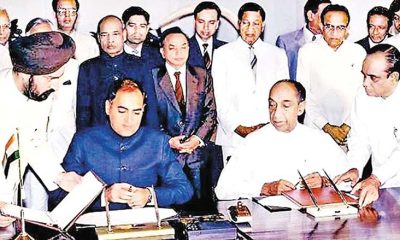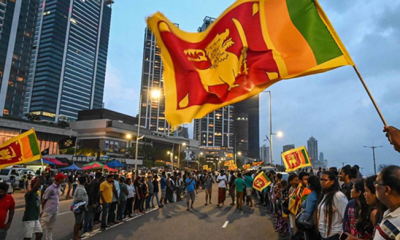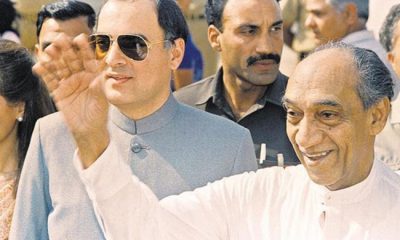Features
Issues in fully implementing the 13th Amendment – Police Powers
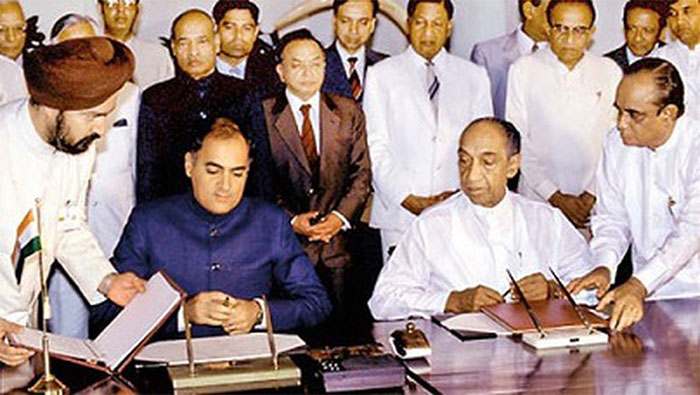
By C. A. Chandraprema
While most provisions of the 13th Amendment to the Constitution have been implemented, sticking points have persisted with regard to two matters – the devolution of police and land powers. Appendix I of the Provincial Councils List in the Ninth Schedule of the Constitution provides for the devolution of police powers. The implementation of these provisions will entail the division of the Sri Lanka Police Force into a National Police Division which includes special units such as the CID; and a Provincial Police Division for each Province, headed by a DIG.
According to Section 6 of Appendix 1, the IGP shall appoint a DIG for each Province with the concurrence of the Chief Minister of the Province. If there is no agreement between the IGP and the Chief Minister, the matter will be referred to the National Police Commission, which after due consultations with the Chief Minister shall make the appointment. Thus, the effective appointing authority of the provincial DIG is the Chief Minister. Section 11 stipulates that all Police Officers, serving in units of the National Division and Provincial Divisions, in any Province, shall function under the direction and control of the provincial DIG who, in turn, will ‘be responsible to’ and ‘under the control of’ the Chief Minister in respect of the maintenance of public order and the exercise of police powers in the Province.
According to section 12.1, it is the Provincial police forces that will maintain law and order and be responsible for the prevention, detection and investigation of all offences in the Province except for the 11 specified offences allocated to the National Police Division which are as follows: international crimes, offences against the State, offences relating to the armed services, offences relating to elections, currency and government stamps, offences against the President, Ministers, MPs public officials, judges, etc., offences relating to state property, offences prejudicial to national security, offences under any law relating to any matter in the national government list and offences in respect of which courts in more than one province have jurisdiction. Most of these offences are not really a part of day to day police functions and occur infrequently. Thus, under the 13A, it is the Provincial Divisions which will handle the bulk of actual day to day police work.
Provincial Police to the forefront
Signifying the extent to which the National Police Division will be expected take a back seat, Section 10.1 of Appendix 1 requires members of the National Police Division to ordinarily be in plain clothes, except when performing duties in respect of the maintenance of public order. For all practical purposes, the only uniformed police force, visible to the public, will be the Provincial Police. Recruitment to the National Police Division is to be done by the National Police Commission and to the Provincial Police Divisions by the respective Provincial Police Commissions. According to Section 4, the Provincial Police Commissions will be made up of a) the Provincial DIG, b) a person nominated by the Public Service Commission, in consultation with the President; and c) a nominee of the Chief Minister of the Province. Thus the Chief Minister has complete control over both the Provincial Police Chief as well as the Provincial Police Commission.
In addition to the above, according to Sections 7 and 8 of Appendix 1, the Provincial Police Commissions, which are completely under the sway of the Chief Minister, will have a say in deciding on the cadre and salaries and even the type and quantity of firearms and ammunition used by the Provincial Police forces. However, the potentially horrendous implications of Sections 7 and 8 are mitigated to some extent by the proviso that ‘uniform standards and principles’ shall be applied across the board with regard to these matters for all Provincial Police Divisions.
When recruitment for the Provincial Police Forces are to be carried out by Provincial Police Commissions which are completely under the sway of the Chief Ministers of the Province, the politics of the Province will become the politics of the Provincial Police force, as well. The most obvious foreseeable result of recruiting, within the Province for the Provincial Police force, is that the Northern Province Police force will be predominantly Tamil, the Eastern Province police force largely Tamil and Muslim, and the police forces of all other Provinces, predominantly Sinhala. The implications of politicians, elected on communalistic political platforms, having armed police forces under their control, to further their political objectives, should be clear to anybody. For a country like Sri Lanka which has experienced protracted conflict between ethnic and religious groups, the police powers provisions in the 13A are a guaranteed recipe for disaster.
An equally important consideration is the fact that crime prevention, detection and investigation is very much an inter-provincial, countrywide activity in this country. The creation of nine separate Provincial Police Divisions, answering to nine different lines of command, will seriously hamper the crime fighting capacity of the police which we now take for granted. Today, the IGP and the police force, under him, acts on the imprimatur of the national government, and its outreach extends to every nook and corner of the country. If the 13th Amendment is fully implemented, and the principle day to day police functions, such as maintaining law and order, and crime fighting, becomes the exclusive preserve of the various Provincial Police forces, whose authority does not extend beyond the borders of their Provinces, even pursuing a criminal across Provincial borders will become a tedious, process heavy with bureaucratic procedures and the entire country is going to suffer as a result. (The Colombo and Kotte city limits will not belong to the Western provincial police division but to a Metropolitan police under the National Division according to Item 1 on the Provincial Councils List.)
Readers may recall the 2005 incident during the ceasefire where some policemen, attached to the National Child Protection Authority went into an LTTE held area in search of a fugitive European pedophile and were arrested by the LTTE police. If the police powers in the 13A are fully implemented, in a context where some Provincial administrations are going to be openly hostile to the national government, as well as to other Provincial administrations, similar incidents will become day to day occurrences. The sheer practical impossibility of effectively carrying out police work in a small, densely populated country divided into nine separate police jurisdictions, manned by police forces under nine different lines of command was one of the main reasons why the police powers in the 13A have remained unimplemented for the past 37 years.
Political control over Provincial Police forces
While the IGP will nominally remain the head of the Sri Lanka Police force, even under the 13A, actual day to day police work will become the preserve of the provincial DIGs, acting under the direction and control of the respective Chief Ministers. Under Section 12.4(b) of Appendix 1, the IGP’s discretion in matters related to crime fighting will largely be centered on assigning investigations to units of the national division, like the CID, if he believes that is required in the public interest. But even to do that, he will need to ‘consult’ the Chief Minister of the Province and to have the approval of the Attorney General. Appendix 1 does not have provisions for any mechanism to enable the Provincial Police forces to work in unison in crime fighting or indeed any mechanism that can respond expeditiously to crime fighting requirements throughout the country.
The 13A was passed into law nearly four decades ago, in a different era. In the new millennium, the dominant trend has been to prevent politicians from influencing the police force but the provisions in the 13A seeks to do exactly the opposite.
Even though the new millennium has seen three Constitutional Amendments, (the 17th, 19th and 21st) promulgated for (among other things) the depoliticisation of the police force, Appendix 1 of the Provincial Councils List in the Ninth Schedule of the Constitution, was left largely untouched. I use the word ‘largely’, because the 17th Amendment did make a few changes in Appendix 1, but that was only to reduce the powers of the President. The Chief Minister’s powers over the Provincial Police remained untouched.
The total and complete politicisation of the police force, envisaged in the 13A, renders it out of step with the times. It was just a few months ago that the 21st Amendment to the Constitution was passed and under its provisions, the President cannot appoint the IGP unless the Constitutional Council approves his recommended candidate and the President cannot appoint the Chairman and Members of the National Police Commission except on the recommendations of the Constitutional Council.
How will the people of this country react if the police powers, envisaged in the 13A, are implemented, and they wake up one morning to find that the Chief Ministers have been given effective control over the appointment of the provincial DIGs and complete control of the Provincial Police Commissions?
How will the people react when they find that the country has been rendered ungovernable overnight because the police force has been fragmented into nine separate police forces, under nine different chains of command? The gestation period for the fallout resulting from a wrong decision with regard to the police powers laid out in the 13A will not be years or months but weeks and days. Hence this is an area where the government will have to proceed with great caution.
Features
‘Silent Majority’ abandoned to Long-suffering in regional conflicts

 With reports emerging that India has attacked some ‘sites’ in Pakistan and Pakistan-administered Kashmir, the question could be posed whether the stage has just been set for yet another costly India-Pakistan military conflict. Sensible opinion in South Asia could only hope that wise counsel would sooner rather than later come to prevail on both sides of the divide and that they would draw back from the brink of full-scale war.
With reports emerging that India has attacked some ‘sites’ in Pakistan and Pakistan-administered Kashmir, the question could be posed whether the stage has just been set for yet another costly India-Pakistan military conflict. Sensible opinion in South Asia could only hope that wise counsel would sooner rather than later come to prevail on both sides of the divide and that they would draw back from the brink of full-scale war.
The states concerned ought to know fully well the possible wide-ranging weighty consequences of another regional conflict. It should be plain to see that it would benefit none in the two theatres of confrontation, most particularly the relevant publics or the ‘Silent Majority’.
In fact, in connection with the mentioned initial military attacks, the Pakistani side has gone on record that some civilian lives have been lost. Such losses could burgeon in the event of full scale hostilities. These costs could of course be staggering and unimaginable in the event the nuclear option is resorted to by the sides, going forward.
Accordingly, the hope of the peace-loving world-wide is likely to be that India and Pakistan would give negotiations a chance and resolve their differences peacefully. It would be in the best interests of the world for the champions of peace to join their voices to that of UN chief Antonio Guterres and call on the sides to negotiate an end to their differences.
The utter helplessness and misery of the people of the Gaza ought to drive home afresh the horrors of war. Currently the news is that the Gazans are literally starving to death. Food and other essentials provided by UN agencies are reportedly being prevented by Israel from getting to the hapless people of Gaza. So dire is their situation that concerned quarters are calling on the compassionate worldwide to provide the Gazans with food, water and other essentials voluntarily. This SOS would need to be heeded forthwith.
Accordingly, it could be inferred that most formal arrangements, including those that are generally under the purview of the UN, geared to providing emergency humanitarian assistance to the needy, have, for all intents and purposes, been rendered ineffective in the Gaza. The UN cannot be faulted for this state of things; rather, Israel should be held accountable in the main for it.
The matter of accountability is central to the dramatic slide into lawlessness the world has been experiencing over the past few decades. As could be seen, International Law is no longer fully applicable in the conflict and war zones of the world because it is not being adhered to by many state and non-state aggressors. That the UN is hapless in the face of such lawlessness is plain to see.
We have of course the Middle East wherein International Law has fallen silent for quite a while. How could it be otherwise, when Israeli aggressions are being winked at by the US, for which the policy of backing Israel is almost sacrosanct?
Moreover, under President Donald Trump, it is difficult to see the US changing policy course on the Middle East. Trump made vague promises of bringing peace to the region in the run-up to his reelection but has done nothing concrete by way of peace-making. Consequently, complete lawlessness prevails in the Middle East. US policy towards Israel counts as another example of how the self- interest of US central administrations blinds them to their international obligations, in this case Middle East peace.
However, the commentator could be criticized as being biased if he holds only Israel responsible for what has befallen the Middle East. It has been the position of this columnist that Israel’s security needs should be taken cognizance of by its state and non-state adversaries in the Middle East and acted upon if the basis is to be laid for a durable Middle East peace. Inasmuch as Palestinian statehood must be guaranteed, the same should be seen as applicable to Israel. The latter too enjoys the right to live in a secure state of its own, unopposed by its neighbours.
The Ukraine of today is also sad testimony to the ill consequences of powerful, aggressor states wantonly disregarding International Law and its obligations. Nothing could justify Russia in invading Ukraine and subjecting it to a condition of Longsuffering. Clearly, Ukraine’s sovereignty has been violated and such excesses go to the heart of the current state of ‘International Disorder’. Of course the same stricture applies to the US in relation to its military misadventures in Afghanistan and Iraq, to name just two such modern examples.
There is no ducking the fact, then, that civilian publics in the mentioned theatres of war and outside, are being subjected to the worst suffering as a consequence of the big powers’ self-aggrandizement schemes and military misadventures. Longsuffering becomes the tragic lot of the people who have nothing to do with such unbridled power ambitions.
One would not be exaggerating the case if he states that civilian publics count for almost nothing in the present ‘International Disorder’. Increasingly it is becoming evident that from the viewpoint of the big powers and authoritarian governments the people are of little or no importance. Considering that self-aggrandizement is of the paramount interest for the former the public interest is coming to be seen as inconsequential.
Consequently, not much of a case could be made currently for the once almost reverentially spoken of ‘Social Contract’. For, the public interest does not count for much in the scrambles for power among the major powers who are seen at the popular level as the principal history-makers.
It is in view of the above that much is expected of India. Today the latter is a ‘Swing State’ of the first importance. Besides being a major democracy, it is one of the world’s principal economic and military powers. It possesses abundant potential to help to put things right in international politics. If there is one state in Asia that could help in restoring respect for International Law, it is India.
Considering the above, India, one believes, is obliged to bear the responsibility of keeping South Asia free of any more long-running, wasting wars that could aggravate the material hardships and socio-economic blights of the region. Thus, India would need to consider it imperative to negotiating peace with Pakistan.
Features
Memorable happening … Down Under

 Under the Global-Ise Australia Advanced Sports Development Programme, a delegation of 15 swimmers from Lyceum International School, Wattala, had the remarkable opportunity to train and experience high-performance sports development in Melbourne, Australia.
Under the Global-Ise Australia Advanced Sports Development Programme, a delegation of 15 swimmers from Lyceum International School, Wattala, had the remarkable opportunity to train and experience high-performance sports development in Melbourne, Australia.
The 10-day programme was carefully curated to offer intensive training, educational exposure, and cultural experiences for the young athletes.
The swimmers underwent specialised training through Swimming Victoria’s elite programme, held at some of Melbourne’s premier aquatic facilities.

Visit to Victorian Parliament
Each day began as early as 5:00 a.m. and continued until 7:00 p.m., ensuring a rigorous and enriching schedule that mirrored the standards of international competitive swimming.
Beyond training, the programme offered a wide array of experiences to broaden the students’ horizons.
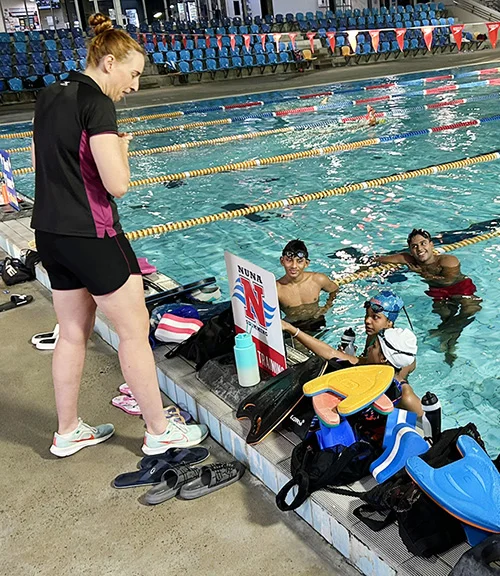
Morning training
The tour group explored iconic landmarks such as the Victorian Parliament and the Melbourne Cricket Ground (MCG), and enjoyed shopping at Chadstone – The Fashion Capital. They also experienced the natural beauty of Victoria with visits to Yarra Valley Chocolaterie & Ice Creamery, and Cardinia Reservoir Park, where they observed kangaroos in their natural habitat.
An academic highlight of the tour was the group’s exclusive visits to three of Australia’s leading universities: the University of Melbourne, Monash University, and Deakin University. These visits aimed to inspire students and showcase the vast educational opportunities available in Australia.

Checking out the scene at Yarra Valley Chocolaterie & Ice Creamery
As part of the cultural immersion, Global-Ise hosted a traditional Australian BBQ at the Tim Neville Arboretum in Ferntree Gully. The students also enjoyed a variety of diverse culinary experiences each evening, further enriching their understanding of local and international food cultures.
The tour concluded with a celebratory dinner at the Spicy Wicket Restaurant, where each participant received a presentation in recognition of their involvement.

Enjoying an Aussie BBQ for lunch
The evening was made especially memorable by the presence of Pradeepa Saram, Consul General of Sri Lanka in Victoria.
Global-Ise Management—Ken Jacobs, Johann Jayasinha, and Dr Luckmika Perera (Consultant from the University of Melbourne)—did a magnificent job in planning and the execution of the advanced sports programme.

Coaches from Sri Lanka presenting a plaque to Global-Ise Management team
Ken Jacobs (centre), Johann Jayasinha, and Dr Luckmika Perera (on the right
Features
Bright, Smooth Skin

 Hi! How’s the beauty scene keeping with you?
Hi! How’s the beauty scene keeping with you?
Phew, this heat is awful but there is nothing that we can do about it.
However, there are ways and means to take care of your skin and I will do my best to help you in every way I can.
Well, this week, let’s go for a Bright, Smooth Skin.
Gram flour (also known as besan) is a traditional skincare ingredient known for its:
* Natural exfoliating properties.
* Ability to absorb excess oil.
* Gentle brightening and tan-removal effects.
* Suitability for all skin types, especially oily and acne-prone skin.
You will need 01–02 tablespoons gram flour (besan) and rose water, or raw milk, to make a paste.
You could add the following two as optional add-ins: A pinch of turmeric (for extra glow), and a few drops of lemon juice (for oily skin and pigmentation)
Add the gram flour to a small bowl and mix in the rose water (for oily/sensitive skin) or raw milk (for dry skin) slowly.
Stir well to make a smooth, spreadable paste—not too thick, not too runny.
Now apply this mixture, evenly, to your damp face and neck, and let it sit for 5–10 minutes (don’t let it dry completely if you have dry skin).
Gently massage in circular motions using wet fingers—this helps exfoliate.
Rinse off with lukewarm water, and then pat your skin dry.
Use it 02–03 times a week for best results.
Skin Benefits:
* Removes dirt, sweat, and oil without stripping natural moisture.
* Gently exfoliates dead skin cells, revealing smoother skin.
* Brightens the complexion and fades mild tanning.
* Helps clear clogged pores and reduce pimples.
* Leaves skin fresh and glowing—perfect for humid climates.
-

 News6 days ago
News6 days agoRanil’s Chief Security Officer transferred to KKS
-

 Opinion4 days ago
Opinion4 days agoRemembering Dr. Samuel Mathew: A Heart that Healed Countless Lives
-

 Business2 days ago
Business2 days agoAitken Spence Travels continues its leadership as the only Travelife-Certified DMC in Sri Lanka
-

 Business2 days ago
Business2 days agoLinearSix and InsureMO® expand partnership
-

 Business6 days ago
Business6 days agoCCPI in April 2025 signals a further easing of deflationary conditions
-

 Latest News22 hours ago
Latest News22 hours agoNPP win Maharagama Urban Council
-

 Features6 days ago
Features6 days agoExpensive to die; worship fervour eclipses piety
-

 Editorial6 days ago
Editorial6 days agoMay Day hangover and sobering reality



